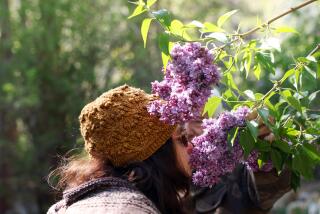Sorrel: Ancient edible wonder -- and potential headache
For the ancient civilizations of the Mediterranean, sorrel soup was a harbinger of spring. The wild perennial, a plant tough enough to endure snow, has fed humans in Europe and Asia for thousands of years.
Today, domesticated varieties are essential for soups, sauces and salads from France to Ukraine, both of which have iconic variations of sorrel soup in their national culinary heritage. The classic French dish soupe aus herbes is based on French sorrel; shchaveloviy borscht is ubiquitous Ukranian fare.
Gardeners can ponder more than 100 varieties of the plant, some with striking rhubarb-red veins in the jade-green leaf. Before the harvest, the plants work well as ornamentals.
The two types of seedlings you’ll most easily find at local nurseries in the months to come are Garden (Rumex acetosa) and French (Rumex scutatus). They differ in taste, color, leaf shape and size. French is generally more lemony. Both can be steamed, boiled, pureed, eaten raw or frozen.
Sorrel has a short shelf life and should used as quickly as possible. It keeps for a day or two in the fridge, for a year in the freezer.
Be warned: This is an aggressive perennial, considered invasive by some gardeners who see it as a weed, albeit an edible one. It starts easily from seed, and once established it can spread rapidly under certain conditions. Garden sorrel likes a damp site, while French sorrel prefers drier soil.
At the Fountain Avenue Community Garden, the sorrel is a thick bush, planted next to the digitalis in the herb garden. Gardener Derbeh Vance remembered a fantastic Julia Child recipe for sorrel soup and said he had his eye on the plant.
At Sepulveda Community Garden in Van Nuys, home to some Russian gardeners, Vel Lauterio said members had so much sorrel jumping out of the plots that they were ripping out the plant.
Like other wild edibles such as amaranth and purslane, sorrel contains oxalic acid and is potentially poisonous if consumed in large quantities. It is not recommended for pregnant women or people with kidney problems, rheumatoid arthritis or gout.
The Global Garden, our series looking at multicultural L.A. through the lens of its landscapes, appears here on Tuesdays. We welcome story suggestions at [email protected].






